 Petzlover
Petzlover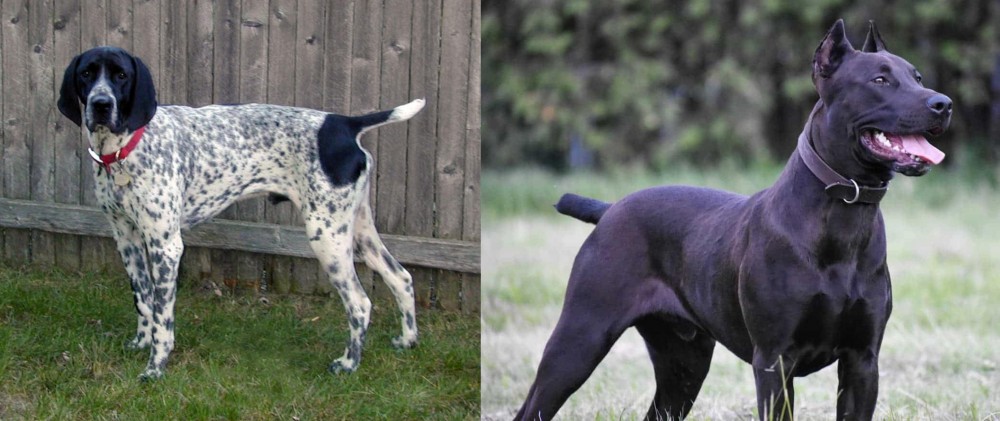 Braque d'Auvergne is originated from France but Canis Panther is originated from United States. Braque d'Auvergne may grow 12 cm / 4 inches shorter than Canis Panther. Both Braque d'Auvergne and Canis Panther are having almost same weight. Braque d'Auvergne may live 3 years more than Canis Panther. Braque d'Auvergne may have more litter size than Canis Panther. Both Braque d'Auvergne and Canis Panther requires Low Maintenance.
Braque d'Auvergne is originated from France but Canis Panther is originated from United States. Braque d'Auvergne may grow 12 cm / 4 inches shorter than Canis Panther. Both Braque d'Auvergne and Canis Panther are having almost same weight. Braque d'Auvergne may live 3 years more than Canis Panther. Braque d'Auvergne may have more litter size than Canis Panther. Both Braque d'Auvergne and Canis Panther requires Low Maintenance.
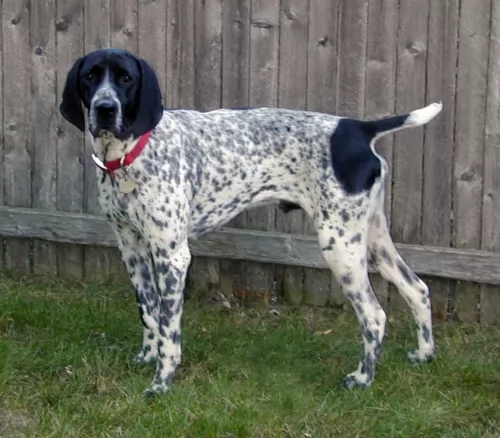 Sometime over 5 centuries ago, in the Cantal Region of France, was born a hunting breed, that might be the real ancestor of today’s pointing hunter dogs. Perhaps the oldest of all pointing gun dog is the Braque d’Auvergne. This breed comes from Central France in the region of Auvergne. This breed was developed prior to written dog breeding records in order to hunt in this region and find, point, flush out and retrieve fowl. This breed is clearly one of if not the oldest breeds in the French Braque. There is no agreement among historians on what breed is the oldest of the European pointing dogs and where they were developed – was it Spain or was it France? It is thought that the Braque Francais Gascogne is the original one of these in the early 1600’s while the Braque d’Auvergne came soon after. Due to the different hunting needs in the different parts of France, the Braque Francais Gascogne was crossed with a lot of other local scent hounds. The Braque d’Auvergne is one of the very oldest of all of these. There are records of the breeds existence in the 1700’s. It is probable that the Braque d’Auvergne was developed by crossing local dogs with Gascogne as well as with the Petit Bleu de Gascogne and the Grand Bleu de Gascogne.
Sometime over 5 centuries ago, in the Cantal Region of France, was born a hunting breed, that might be the real ancestor of today’s pointing hunter dogs. Perhaps the oldest of all pointing gun dog is the Braque d’Auvergne. This breed comes from Central France in the region of Auvergne. This breed was developed prior to written dog breeding records in order to hunt in this region and find, point, flush out and retrieve fowl. This breed is clearly one of if not the oldest breeds in the French Braque. There is no agreement among historians on what breed is the oldest of the European pointing dogs and where they were developed – was it Spain or was it France? It is thought that the Braque Francais Gascogne is the original one of these in the early 1600’s while the Braque d’Auvergne came soon after. Due to the different hunting needs in the different parts of France, the Braque Francais Gascogne was crossed with a lot of other local scent hounds. The Braque d’Auvergne is one of the very oldest of all of these. There are records of the breeds existence in the 1700’s. It is probable that the Braque d’Auvergne was developed by crossing local dogs with Gascogne as well as with the Petit Bleu de Gascogne and the Grand Bleu de Gascogne.
In all of Western Europe, the region of Auvergne is not very populated and has unique geography in that is hilly and has many extinct and eroded volcanoes. A lot of the region is still unpopulated. In this environment, wildlife has flourished, and hunting is successful in providing food for the regions people. This circumstance with an abundance of birds, led to the breeding of the Braque Auvergne to specialize in hunting in this area. The breed is not very popular outside of Auvergne and probably never was. That fact allowed them to be devastated by the Second World War. The Reunion des Amateurs de Braque d’Auvergne (RABA) was started to promote the pure breeding and the protection of the d’Auvergnes. But when Auvergnes was occupied during the war, the slowed breeding of the Braque d ‘ Auvergne almost eliminated the breed. There might have only been about 25 dogs left following the end of the war. These remaining dogs were used to revive the breed, but it is still uncommon, but not rare. Individuals have been imported by other countries including North America. The United Kennel Club (UKC) accepted the breed in 2006 but is not accepted by the AKC (American Kennel Club). The breed is still a working breed and outside of France, very rare.
 The Canis Panther is a strong, muscled dog who has been developed in the USA in the 1970s by Scorpio Jones, Michael Stratten, and Lucas Lopez. They mixed the Doberman Pinscher, the Great Dane the Labrador Retriever and the American Staffordshire Bull Terrier.
The Canis Panther is a strong, muscled dog who has been developed in the USA in the 1970s by Scorpio Jones, Michael Stratten, and Lucas Lopez. They mixed the Doberman Pinscher, the Great Dane the Labrador Retriever and the American Staffordshire Bull Terrier.
This dog hasn’t got a long history, having only been established in the 1970's, but the breeders wanted a dog much like the Doberman but somewhat larger and stronger. It is a dog breed which is still fairly unknown in the United States and elsewhere.
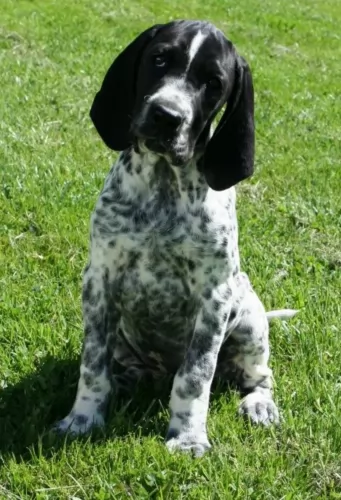 The Braque d’Auvergne is a well built, strong hunting dog with long ears, a large head and a docked tail. His coat is white with black markings and black ears and head. The breed looks a lot like all the other pointing dogs from France. They are medium in stature and has the appearance of a working gundog. He is athletic, muscular and fit. Docking the tail is outlawed in many countries and all of the United Kingdom. In that case the tail is high on the rump and always straight. Their face and head are big for the size of the body and shaped like an oval. With a long muzzle, deep set eyes and a gentle expression, they are kindly and handsome dogs. Their skin is loose but not droopy or wrinkled like hound dogs.
The Braque d’Auvergne is a well built, strong hunting dog with long ears, a large head and a docked tail. His coat is white with black markings and black ears and head. The breed looks a lot like all the other pointing dogs from France. They are medium in stature and has the appearance of a working gundog. He is athletic, muscular and fit. Docking the tail is outlawed in many countries and all of the United Kingdom. In that case the tail is high on the rump and always straight. Their face and head are big for the size of the body and shaped like an oval. With a long muzzle, deep set eyes and a gentle expression, they are kindly and handsome dogs. Their skin is loose but not droopy or wrinkled like hound dogs.
 The Canis Panther is a large dog measuring roughly 68 – 77 cm in height and weighing around 50 to 63 kg. He has a deep chest and strong neck. The coat is short and dense and it is is essentially a solid color - fawn, grey, blue, chocolate or black.
The Canis Panther is a large dog measuring roughly 68 – 77 cm in height and weighing around 50 to 63 kg. He has a deep chest and strong neck. The coat is short and dense and it is is essentially a solid color - fawn, grey, blue, chocolate or black.
He looks magnificent with his cropped ears and short docked tail. Unfortunately with regulations surrounding the docking of dog’s tails, the dog these days is often left with a long tail.
He is an intelligent, territorial dog and makes an excellent watchdog. He is a dog which can be easily trained and socialized and then he makes a great family dog. He is loving and loyal to his human family, being somewhat aloof with strangers. His gets along well with children in the home as well as with other pets.
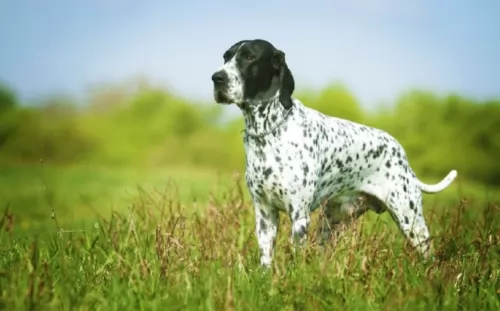 This is a gentle, adaptable and obedient breed. With their intelligence and affectionate nature, they make great family dogs and are eager to please their people. Living with other dogs is fine but not with small, prey size animals. The Braque d’Auvergne should never be left alone pets like gerbils and hamsters. They must be socialized to cats as pets and not prey before living with them successfully. They need to work closely with one human partner. They are first and foremost a hunting dog and need some sort of hunting simulation. They are devoted to their families and want to be constantly in their presence. This can lead to separation anxiety if they are left alone too much. They are great with children and need a family.
This is a gentle, adaptable and obedient breed. With their intelligence and affectionate nature, they make great family dogs and are eager to please their people. Living with other dogs is fine but not with small, prey size animals. The Braque d’Auvergne should never be left alone pets like gerbils and hamsters. They must be socialized to cats as pets and not prey before living with them successfully. They need to work closely with one human partner. They are first and foremost a hunting dog and need some sort of hunting simulation. They are devoted to their families and want to be constantly in their presence. This can lead to separation anxiety if they are left alone too much. They are great with children and need a family.
 The Canis Panther is a loving dog in spite of his large, guard-dog looks. He is intelligent, bold and courageous, and when trained and socialized is a devoted, loyal, loving pet.
The Canis Panther is a loving dog in spite of his large, guard-dog looks. He is intelligent, bold and courageous, and when trained and socialized is a devoted, loyal, loving pet.
He is known for his high intelligence and becomes so attached to his human family he will fight to the death for them if needs be. He is a territorial dog and won’t welcome strangers to his door.
The Canis Panther puppy is outgoing and playful, loving the company of kids in the family.He requires a firm owner who can see to it that he gets in a good quota of exercise. He is an energetic dog and if he isn’t given enough exercise he can become destructive and aggressive through no fault of his own but because of an irresponsible owner.
The Canis Panther is a large dog but given love and proper care he becomes the most awesome, strong devoted pet and protector.
 The Braque d’Auvergne is a healthy breed but can face some of the same health concerns as other pointers and hunting dogs. The long, droopy ears can get infected easily if wet and need to be cleaned regularly so that food or dirt are not trapped their either. Because of the small gene pool however they may be at risk for several issues. The breeders in France express concerns about possible hip dysplasia and testing is highly recommended. Because they are at risk for other conditions that might not show up until later in life, it is also recommended that they be tested by the Canine Eye Registration Foundation (CERF) as well as the Orthopedic Foundation for Animals (OFA).
The Braque d’Auvergne is a healthy breed but can face some of the same health concerns as other pointers and hunting dogs. The long, droopy ears can get infected easily if wet and need to be cleaned regularly so that food or dirt are not trapped their either. Because of the small gene pool however they may be at risk for several issues. The breeders in France express concerns about possible hip dysplasia and testing is highly recommended. Because they are at risk for other conditions that might not show up until later in life, it is also recommended that they be tested by the Canine Eye Registration Foundation (CERF) as well as the Orthopedic Foundation for Animals (OFA).
 The Canis Panther breed is not known to have any particular illness and he can live to be 10, 11 or 12 years of age. However, like every other dog, there are some more common dog illnesses that you will need to be aware of and which are seen more commonly in larger dog breeds, some of which are -
The Canis Panther breed is not known to have any particular illness and he can live to be 10, 11 or 12 years of age. However, like every other dog, there are some more common dog illnesses that you will need to be aware of and which are seen more commonly in larger dog breeds, some of which are -
Larger breeds can be prone to bone cancer, known as Osteosarcoma and found more often in the limbs. Dogs develop swelling in the affected part of the limb and the bones can break easily. If you notice swelling or limping, see that you get your pet to the vet.
This is another kind of cancer which affects the Lymphocytes, a type of white blood cell. Dogs with Lymphoma may have an enlarged lymph node under the chin and neck for instance or the swelling could be in the groin area. Get your dog to the vet so as to have the lump biopsied.
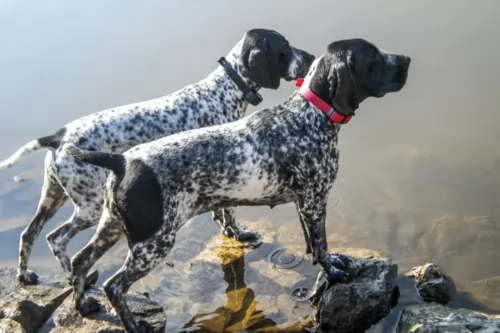 The Braque d’Auvergne needs a high-quality diet fit for a working dog but not too much to make him obese. They are an active breed to choose a formula that is designed for working dogs.
The Braque d’Auvergne needs a high-quality diet fit for a working dog but not too much to make him obese. They are an active breed to choose a formula that is designed for working dogs.
Although no studies have been conducted on the Braque d’Auvergne’s health issues there are many conditions that similar breeds are susceptible to and the d’Auvergne might be as well. This includes any of the following:
This is an active, working dog who needs a lot of stimulation and exercise. The only real appropriate exercise for these dogs is hunting or outings in the woods. He not only needs the exercise, but he also needs to stimulate his sense of smell and his gundog intelligence. He might excel in lure chase or even a form or barn hunt. They certainly could excel at obedience trials and perhaps rally. If you are a weekend hunter then this is the ideal dog for you. They are so easy to train that they surpass other pointers for success with casual hunters. They hunt at a slower pace than many other gundogs. Their intelligence and athleticism lend itself well to agility and flyball also. They need a large (+acres)fenced in area to run and play.
 With his short coat, the Canis Panther is looked upon as a low mainenance dog. You’ll need to brush his hair at least twice a week though to remove loose hairs and keep the coat shiny.
With his short coat, the Canis Panther is looked upon as a low mainenance dog. You’ll need to brush his hair at least twice a week though to remove loose hairs and keep the coat shiny.
Brush your pet’s teeth at least 2 or 3 times a week. You get special toothpaste and toothbrush for dogs and your vet can guide you on how to use them. If you don’t attend to your pet's teeth, he can experience tartar build up. This can lead to gum disease and tooth loss. Not only that, bad teeth can affect other parts of the body too.
This breed comes from several large dog breeds and as a big dog, he is certainly going to need a good deal of exercise. He’ll need a walk every day or perhaps frisbee games in the park where he is made to run.
Any dog requires exercise, and especially a magnificent dog like this one. You want to make sure you maintain those lean, muscled limbs by ensuring he gets his fair share of exercise.